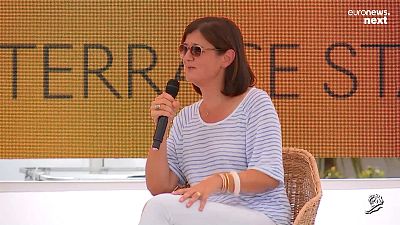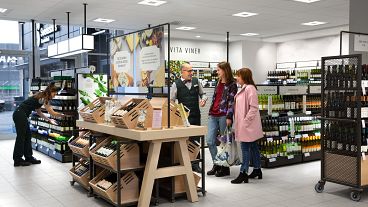Creativity is all about connection and increasingly brands will communicate via evolving technologies as the metaverse takes shape, says Meta’s Angie Gifford.
“Creativity is about connection, but it's a different way to connect these days,” said Angie Gifford.
Creators, business messaging and virtual reality are redefining how businesses will connect and communicate with consumers, Meta’s Vice President EMEA told Euronews Next at the 2022 Cannes Lions Festival of Creativity.
And what’s more, she says, brand leaders should be paying closer attention.
“For B2B and B2C, we see great tech improvements that can help how you communicate,” she said.
“Companies are getting on their tippy toes right now to say, hey if I miss that trend, I'm going to have a problem”.
Gifford, who has over 30 years experience working for technology companies including Hewlett Packard and Microsoft, said leaders have woken up to the importance of new communication technologies and channels since the COVID-19 pandemic.
Her ideas on innovation and connection were shared during Cannes Lions’ Changemakers series where she also discussed the journey to make the metaverse a reality - something she says will take shape between five to seven years from now.
So, how does virtual reality, creators and text play a role in the metaverse and what do marketing and communication leaders need to know?
Virtual and augmented reality
The metaverse, being built by companies such as Meta, Google, Amazon and Apple together with researchers and academics, is a 3D virtual world made up of content and digital avatars.
Online experiences in the metaverse will be much more interactive than current augmented (AR) or virtual reality (VR) tech allows, which will help brands to create a unique sensory experience and a stronger connection with consumers.
“Rather than watching the Internet, you will be on it. This is the next immersive version of the internet and how we are going to be together. It’s the next big thing,” said Gifford.
There are already over 700 million people across Meta’s platform using AR and VR for purposes such as education, interactive communication and entertainment.
Meta is collaborating with the the Alte Nationalgalerie in Berlin, for instance, to create a digital art experience to better connect with younger audiences. Users can not only see a painting, but can also “go into the picture” and view other works of that era in 3D using a VR headset.
German automaker BMW is also using VR to give potential customers an immersive experience of their latest model.
And this tech won’t just be used with brands; greater accessibility and adoption will see everyday people using AR and VR in the future to connect online with their loved ones, as they do with video calls today.
Creators
Creators - musicians, artists, dancers, chefs and other creatives who exploit their passion to produce and publish content - can drive online communities and help brands share messages in an authentic and indirect way.
Whilst these artists have been hugely successful on platforms like YouTube and Instagram, the metaverse will unleash more opportunities and Meta sees this as a critical part of their strategy.
“Creators are such an important community that we serve and serve to. Meta is spending one billion dollars this year on creators,” she said.
“Everybody can be a creator, it's not just for big agencies and the big brands. The role of the creator has changed and it’s become more important.”.
Business messaging and chatbots
AI-powered chatbots, WhatsApp text for customer service or Slack to communicate with your colleagues; these platforms are more common than picking up the phone and companies should factor these platforms into strategies.
Younger generations, in particular, prefer text to voice calls.
“Sixty-seven per cent of the customers that we ask, say they'd love to have a brand that has a chatbot. They feel much better connected than anything in the call centre,” she said.
But despite these technological advancements and the opportunities they create, Gifford says that nothing should replace human connection and these platforms exist only to enhance the online connection.
“We do not want to substitute time in the metaverse with any physical interaction. We cannot substitute face to face with the best hologram on the planet,” she said.
“But the time we spend online, we want to bring up the quality and we want to also bring people together that cannot be together”.
- _For more on this story, watch an edited version of the full interview in the media player for comments on how Meta is tackling privacy and online safety in the metaverse.
_ - To watch the entire video, visit the Cannes Lions website.
- _The Changemakers series in partnership with Cannes Lions Live and Euronews Next is a one-to-one interview series with female leaders who are rethinking their roles and creating a better future for their industry.
_



